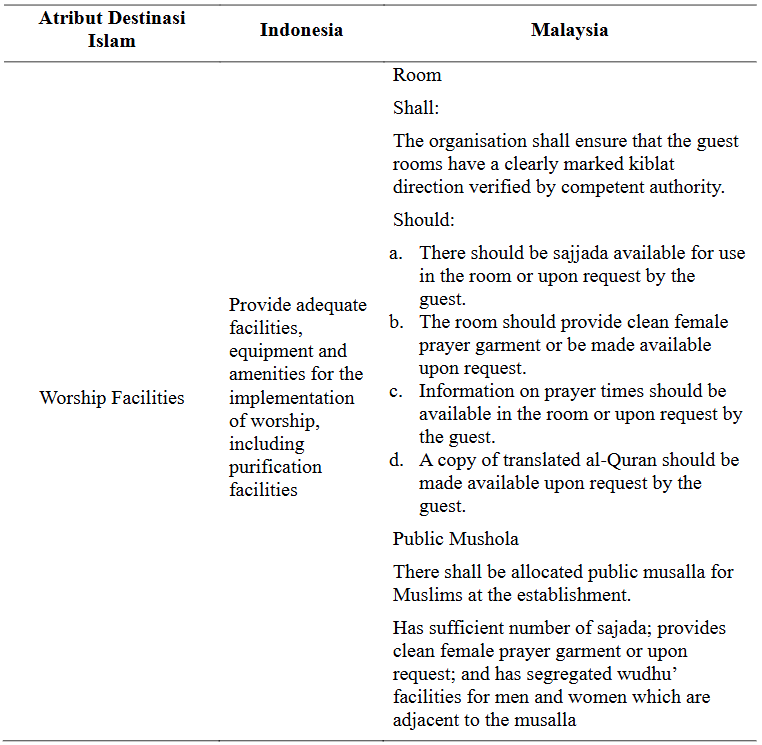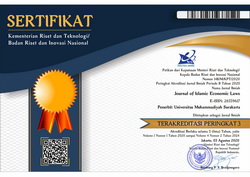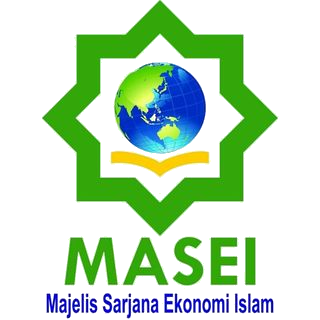Sharia Hotel Management Policy: An Analysis of Islamic Attribute of Destination Theory in Indonesia and Malaysia
DOI:
https://doi.org/10.23917/jisel.v7i01.5254Keywords:
Islamic Attribute of Destination, Sharia Hotel, Halal Tourism, Indonesia, MalaysiaAbstract
Islamic Destination Attributes play an essential role in influencing Muslim travelers' interests. This study analyses IAD by comparing Indonesia and Malaysia's current Islamic hotel policies. It was found that there are four dimensions of IAD, namely Worship Facilities, Islamic Facilities, General Islamic Facilities, and Halal Food, which are in accordance with Fatwa Number 108/DSN-MUI/X/2016 fifth article and MS 2610 2015 fourth and fifth articles. IAD is essential for Muslim hotel customer satisfaction. Both policies have fulfilled these four criteria. This study can contribute to academics and researchers in developing a more profound IAD theory. Although limited to the Islamic hotel sector, IAD studies can develop in other sectors with the same policy, such as travel agencies or tour guides.
Downloads
References
Alam, A., Mellinia, R., Ratnasari, R. T., & Ma’aruf, A. (2023). A systematic review of halal hotels: A word cloud and thematic analysis of articles from the Scopus database. International Journal of Advanced and Applied Sciences, 10(8), 166–175. https://doi.org/10.21833/ijaas.2023.08.019
Alam, A., Mellinia, R., Ratnasari, R. T., & Mawardi, I. (2024). Analysis of Halal Ecotourism Digital Campaigns in a Mosque by an Online Environmental Community. International Journal of Sustainable Development and Planning, 19(7), 2651–2659. https://doi.org/10.18280/ijsdp.190721
Alam, A., Ratnasari, R. T., Prasetyo, A., Hapnitasari, I., & Rahmawati, E. (2024). Systematic Literature Review on Halal Label Studies of Halal Tourism. TEM Journal, 13(1), 635–645. https://doi.org/10.18421/TEM131-66
Alam, A., Ratnasari, R. T., Ryandono, M. N. H., Prasetyo, A., Syahidah, Y., & Bafana, F. A. (2024). A comparative systematic literature review between Indonesia and Malaysia Halal tourism studies (2010-2022). Multidisciplinary Reviews, 7(3). https://doi.org/10.31893/multirev.2024061
Alam, A., Sukmana, R., Ratnasari, R. T., Arfiatin, I., & Mellinia, R. (2023). Exploring the spiritual and experiential dimensions of Sharia-compliant hotels in Indonesian halal tourism: A netnographic analysis of TripAdvisor reviews. International Journal of Advanced and Applied Sciences, 10(October), 121–131. https://doi.org/10.21833/ijaas.2023.10.014
Battour, M., Battor, M., & Bhatti, M. A. (2014). Islamic attributes of destination: Construct development and measurement validation, and their impact on tourist satisfaction. International Journal of Tourism Research, 16(6), 556–564. https://doi.org/10.1002/jtr.1947
Battour, M., & Ismail, M. N. (2014). The Role of Destination Attributes in Islamic Tourism. SHS Web of Conferences, 7, 1–8.
Darmalaksana, W. (2020). Metode Penelitian Kualitatif Studi Pustaka dan Studi Lapangan. Pre-Print Digital Library UIN Sunan Gunung Djati Bandung, 1–6.
Department of Standard Malaysia. (2015). Muslim friendly hospitality services - Requirements MS 2610:2015. 1–20.
Dewan Syariah Nasional-Majelis Ulama Indonesia. (2016). Fatwa Nomor 108/DSN-MUI/X/2016 tentang Pedoman Penyelenggaraan Pariwisata Berdasarkan Prinsip Syariah (108). 108.
Dienillah, I., Chairus Shadiq, D., & Isnaini, D. (2020). Pengaruh Bauran Pemasaran Terhadap Minat Beli Tamu Hotel Syariah Dengan Religiusitas Sebagai Variabel Moderasi. Esa, 2(2), 32–59. https://doi.org/10.58293/esa.v2i2.20
Dyvik, E. H. (2023). Share of global population by religion 2022 | Statista. Statista. https://www.statista.com/statistics/374704/share-of-global-population-by-religion/
Fadhlan, M., Ganjar, D., & Subakti, E. (2020). Perkembangan Industri Wisata Halal di Indonesia dan Dunia. Indonesian Journal of Halal, 5(1), 76–80.
JAKIM. (2024). Sumber Maklumat Al-Ahkam Al-Fiqhiyyah. JAKIM Malaysia.
Komite Nasional Keuangan Syariah. (2018). Masterplan Ekonomi Syariah Indonesia 2019-2024. Kementerian Perencanaan Pembangunan Nasional/ Badan Perencanaan Pembangunan Nasional, 1–443. https://knks.go.id/storage/upload/1573459280-Masterplan Eksyar_Preview.pdf
Mansyurah, F. A. (2019). Peluang Dan Tantangan Bisnis Hotel Syariah Pada Masyarakat Kosmopolitan. At-Taradhi: Jurnal Studi Ekonomi, 9(2), 91. https://doi.org/10.18592/at-taradhi.v9i2.2511
Mastercard, & CrescentRating. (2019). Global Muslim Travel Index 2019. April, 01-63.
Maulidya, R. N., Kosim, A. M., & Devi, A. (2019). The Influence of Islamic Business Ethics and Service Quality on Satisfaction and Loyalty of Sharia Hotel Customers in Bogor. Jurnal Ekonomi Dan Perbankan Syariah, 11(2), 226. https://doi.org/10.24235/amwal.v11i2.5340
Mawardi, I. (2022). Comparing the Concept of Halal Tourism in Indonesia, Thailand, and Malaysia. Mozaik Humaniora, 21(2), 178–192. https://doi.org/10.20473/mozaik.v21i2.27309
Peristiwo, H. (2020). Indonesian and Malaysian potential for a Halal Tourism Industry. African Journal of Hospitality, Tourism and Leisure, 9(1), 1–16.
Permenparekraf. (2016). Pencabutan atas Peraturan Menteri Pariwisata dan Ekonomi Kreatif Nomor 2 Tahun 2014 tentang Pedoman Penyelenggaraan Usaha Hotel Syariah.
Pranandari, R. P., Amaliah, A., & Prihatiningtyas, D. (2023). Perkembangan Pariwisata Halal Di Indonesia. Muamalah, 9(1), 1–14. https://doi.org/10.19109/muamalah.v9i1.17988
Setyaningsih, R. P. (2022). Isu Halal Internasional dan Regional. Jurnal Kajian Wilayah, 12(1), 121. https://doi.org/10.14203/jkw.v12i1.869
Sudigdo, A., & Khalifa, G. S. A. (2020). The impact of islamic destination attributes on Saudi Arabians’ decision to visit Jakarta: Tourism destination image as a mediating variable. International Journal of Religious Tourism and Pilgrimage, 8(3), 15–30.
Susilawati, C. (2023). Identification and Efectiveness of Halal Tourism Laws in Indonesia. Journal of Islamic Economic Laws, 6(2), 110–132.
Tamam, A. B. (2021). KEDUDUKAN FATWA MAJELIS ULAMA INDONESIA (MUI) DAN FATWA DEWAN SYARIAH NASIONAL (DSN) DALAM SISTEM HUKUM INDONESIA Ahmad. Al-Musthpfa.JSI by IAI TABAH Is Licensed under a Creative CommonsAttribution- NonCommercial 4.0 International License, 04(01), 1–25. https://ejournal.unuja.ac.id/index.php/hakam/article/view/1368/642
Tao, M., Lahuerto-Otero, E., Alam, F., Aldehayyat, J. S., Farooqi, M. R., & Zhuoqun, P. (2022). Do Religiosity and Ethnocentrism Influence Indian Consumers’ Unwillingness to Buy Halal-Made Products? The Role of Animosity Toward Halal Products. Frontiers in Psychology, 13. https://doi.org/10.3389/fpsyg.2022.840515
Tao, M., Zhuoqun, P., & Alam, F. (2023). Halal food purchase intention: the mediating role of trust in the Chinese consumer market. International Journal of Services Technology and Management, 28(5–6), 343–359. https://doi.org/https://doi.org/10.1504/IJSTM.2023.135069
Wahidati, L., & Sarinastiti, E. N. (2018). Perkembangan Wisata Halal di Jepang. Jurnal Gama Societa, 1(1), 9. https://doi.org/10.22146/jgs.34043

Submitted
Accepted
Published
How to Cite
Issue
Section
License
Copyright (c) 2024 Journal of Islamic Economic Laws

This work is licensed under a Creative Commons Attribution-ShareAlike 4.0 International License.



















